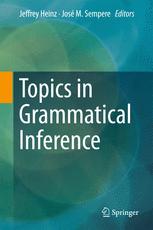

Most ebook files are in PDF format, so you can easily read them using various software such as Foxit Reader or directly on the Google Chrome browser.
Some ebook files are released by publishers in other formats such as .awz, .mobi, .epub, .fb2, etc. You may need to install specific software to read these formats on mobile/PC, such as Calibre.
Please read the tutorial at this link: https://ebookbell.com/faq
We offer FREE conversion to the popular formats you request; however, this may take some time. Therefore, right after payment, please email us, and we will try to provide the service as quickly as possible.
For some exceptional file formats or broken links (if any), please refrain from opening any disputes. Instead, email us first, and we will try to assist within a maximum of 6 hours.
EbookBell Team

4.4
72 reviewsThis book explains advanced theoretical and application-related issues in grammatical inference, a research area inside the inductive inference paradigm for machine learning. The first three chapters of the book deal with issues regarding theoretical learning frameworks; the next four chapters focus on the main classes of formal languages according to Chomsky's hierarchy, in particular regular and context-free languages; and the final chapter addresses the processing of biosequences.
The topics chosen are of foundational interest with relatively mature and established results, algorithms and conclusions. The book will be of value to researchers and graduate students in areas such as theoretical computer science, machine learning, computational linguistics, bioinformatics, and cognitive psychology who are engaged with the study of learning, especially of the structure underlying the concept to be learned. Some knowledge of mathematics and theoretical computer science, including formal language theory, automata theory, formal grammars, and algorithmics, is a prerequisite for reading this book.